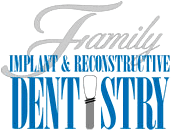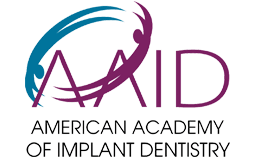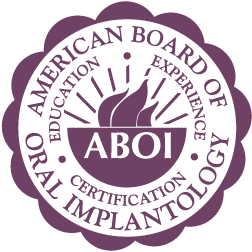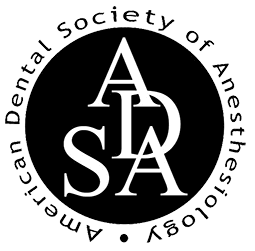Stay Calm and Comfortable at Your Appointment
Does dental anxiety prevent you from getting the dental care you need? At Family Implant and Reconstructive Dentistry in Havre De Grace, MD, Dr. Richard Grubb and his team offer sedation dentistry to help you feel completely comfortable during treatment.
With sedation dentistry, you’ll remain relaxed and pain-free, so you can safely undergo dental procedures without fear or disruption. Call (410) 939-5800 today to learn more and schedule your sedation dental appointments.
What is Sedation Dentistry?
Sedation dentistry involves using medication to induce relaxation and drowsiness during dental procedures. The options we offer include:
IV Sedation
IV sedation involves administering sedative medication directly into your bloodstream through an intravenous (IV) line. This allows for a deeper level of sedation compared to oral or nitrous oxide sedation. While you may not be fully asleep, you’ll be in a deeply relaxed state and may have little to no memory of the procedure. IV sedation is often recommended for patients with higher levels of anxiety, those undergoing complex procedures, or those with strong gag reflexes.
Oral Conscious Sedation
Oral conscious sedation involves taking a sedative medication, such as Valium, in pill form before your dental appointment. This helps ease anxiety and promotes relaxation. While you’ll remain awake during the procedure, you’ll feel significantly calmer and more at ease, and you may have limited or no memory of the experience. The effects of oral sedation can vary from person to person, and your dentist will determine the appropriate dosage based on your needs and anxiety level.
Nitrous Oxide Sedation
Nitrous oxide, often called “laughing gas,” is a mild sedative inhaled through a mask during your appointment. It produces a relaxed, euphoric state, reducing anxiety and discomfort. The effects of nitrous oxide wear off quickly once the mask is removed, allowing you to resume normal activities shortly after 1 your procedure. Nitrous oxide is a safe and effective option for many patients, especially those with mild to moderate anxiety.
Benefits of Sedation Dentistry
Sedation dentistry offers many benefits, including:
- Freedom From Anxiety: If fear has kept you from the dentist, sedation allows you to undergo procedures with zero anxiety or pain.
- Easier Procedures: Extensive treatments can be completed in fewer, shorter visits when the patient is sedated.
- Amnesiac Effects: Many patients have little to no memory of being sedated during the procedure.
- Minimal Noise or Vibration: Dental sedation and gentle techniques help patients avoid sensations that may cause discomfort.
- Quicker Recovery: The relaxed state of sedation minimizes inflammation and stress, allowing you to bounce back faster after procedures.
- Less Need for General Anesthesia: Sedation lets us perform more procedures without requiring hospital-based general anesthesia.
Our Comfort-Focused Dental Sedation Approach
At Family Implant and Reconstructive Dentistry, your comfort comes first. We’ll discuss all your options for relaxation, including sedation or non-sedation techniques. Our modern Havre De Grace dental office provides a peaceful setting to keep you calm from the moment you arrive.
During the procedure, Dr. Grubb uses advanced technology and gentle techniques to ensure a pain-free experience. Your safety and satisfaction are our top priorities.
Advanced Safety Equipment for Your Comfort and Well-Being
Patient well-being is our top priority at Family Implant and Reconstructive Dentistry. Our Havre De Grace dentist equips our office with advanced safety equipment, including:
- Monitoring devices to track heart rate, blood pressure, and oxygen levels
- Emergency medical devices and medications
- Modern vitals monitoring technology
Our dedicated team will diligently monitor you throughout the procedure until you safely recover.
Causes of Dental Anxiety
There are many potential reasons why someone may develop dental anxiety or a phobia of going to the dentist:
- Previous Bad Dental Experience: A traumatic or painful dental visit in the past can trigger anxiety about future procedures. This is especially common if the previous dentist was insensitive to discomfort.
- Fear of Pain: The thought of injections, drilling, or scraping can cause anticipatory pain and make people afraid to visit the dentist. Negative perceptions of dental work persist in media and culture, further feeding fears.
- Feeling Out of Control: Lying in the dental chair can cause some patients to feel vulnerable and trigger anxiety.
- Embarrassment: Some people feel self-conscious about their teeth and dread dentists judging or admonishing them about their oral health, even if this fear is unfounded.
- Sensitivity To Smells and Sounds: The smells of dental disinfectants and the sounds of scraping and drilling can be overstimulating for some patients.
- Underlying Dental Problem: If a patient knows or suspects they have a dental issue but have been avoiding treatment, anxiety can build.
- General Anxiety Issues: An existing anxiety disorder like panic disorder or PTSD involving a lack of control can predispose someone to dental anxiety.
Sedation dentistry at Family Implant and Reconstructive Dentistry helps minimize these potential causes of dental fear, empowering our patients to get the vital care they need.
The Sedation Dentistry Process
If you and our Havre De Grace dentist determine sedation is right for you, here is what you can expect:
Consultation
We’ll discuss sedation options and customize a plan to fit your situation. 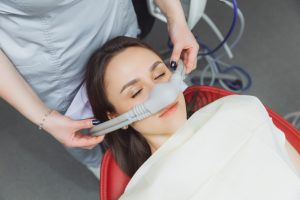
Administration
Dr. Grubb and our team will administer sedatives when you arrive and monitor you as they take effect.
- Nitrous oxide is inhaled through a mask over the nose and mouth.
- Oral conscious sedation uses a pill taken the morning of your appointment, allowing it to set in over the next few hours.
Treatment
Dr. Grubb will complete dental treatment while you remain comfortable and worry-free. Our team will monitor your vital signs throughout the procedure for safety.
Recovery
You’ll relax in our Havre De Grace dental office until the sedation fully wears off. Then you’ll go home to rest. The after-effects of sedation can vary depending on whether you choose nitrous oxide or oral sedation.
Recovery and Post-Sedation Care
After your dental treatment is complete, you’ll remain in our Havre De Grace dental clinic to recover from the effects of sedation and be monitored by our team. Recovery time varies depending on the type of sedation used:
- For oral sedation or nitrous oxide, you may feel back to normal within 30 to 60 minutes.
For oral sedation, you must have a responsible adult accompany you home. Stay hydrated and get plenty of rest after your appointment.
Frequently Asked Questions About Sedation Dentistry
Can I eat before dental sedation?
When you’re sedated, your reflexes are suppressed and if you have food or beverages in your stomach and become nauseous, you’re more likely to vomit and aspirate. If you eat or drink prior to sedation, your procedure will be canceled.
Can I drive myself home after dental sedation?
Can I get dental sedation if I have health issues?
What procedures can be done with sedation?
Schedule Your Dental Sedation Consultation With Dr. Grubb
If fear has been holding you back from needed dental care, sedation dentistry can change your life. Contact us today to discuss how we can help you relax through even the most stressful procedures. Our highly trained team will walk you through the process to determine whether oral sedation or nitrous oxide will work best for you.
You deserve a beautiful, confident smile without anxiety. Call Family Implant and Reconstructive Dentistry in Havre De Grace, MD, at (410) 939-5800 today to schedule a consultation. We’re happy to meet new and returning patients from the Havre De Grace area, including Perryville, Aberdeen, and Churchville, MD.
